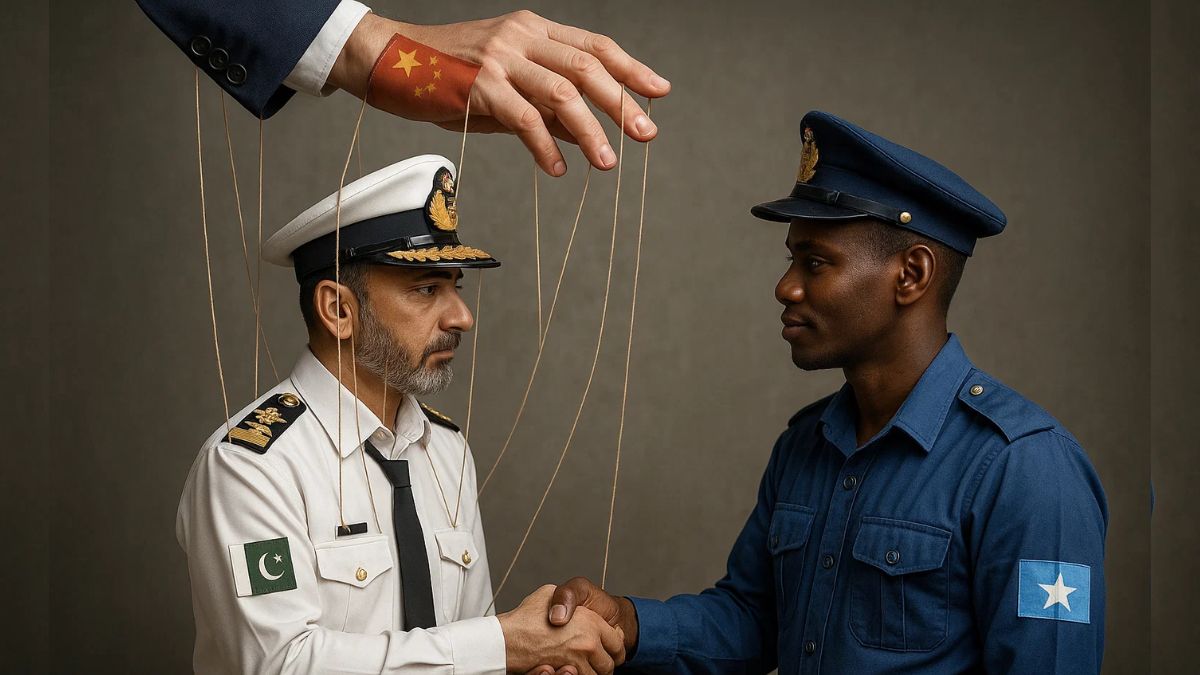Is China’s Influence In Horn Of Africa Now Channelled Via Pakistan And Turkey, Not Bases?

Image courtesy: AI-generated picture via Sora
China has shifted its strategy in the Indian Ocean region, favouring loyal intermediaries over direct military bases. In recent months, Pakistan’s defence outreach to Somalia, coupled with Turkey’s decade-long maritime security pact, reflect a new model of influence: strategic access masked as cooperation. Rather than risking diplomatic fallout, Beijing seems intent on extending its reach through partners who can operate under less scrutiny.
Earlier this year, Somalia approved a defence cooperation framework with Türkiye that will last ten years, aimed at rebuilding its naval force, protecting its coastline, and resolving maritime tensions with neighbouring Ethiopia. In practice, the deal involves training Somali naval officers, equipping naval and coast guard units, and helping patrol and monitor territorial waters. The agreement follows years of Turkish investment in Somalia’s infrastructure, military training, and civilian diplomacy.
At the same time, Pakistan has stepped up its role in the region through a recently reported defence MoU with Somalia, covering naval capacity building, training cadets and technical support. While these partnerships are officially framed around capacity building, they unfold in strategic waterways and ports that align with China’s maritime interests— an alignment that raises questions about influence, sovereignty, and the genuine beneficiaries of these deals.
How is China’s proxy strategy unfolding in the Horn of Africa?
China’s approach in the region has evolved. Its first overseas military base, established in Djibouti in 2017 on the Red Sea’s edge, marked a turning point but also triggered strong diplomatic pushback from regional and global powers. Since then, overt bases have proven costly in terms of perception and strategic trust. As a result, Beijing appears to favour arrangements that deliver similar benefits— access to ports, surveillance routes, logistic support— without formal PLA installations or permanent overseas personnel openly acknowledged in foreign territories.
By empowering Pakistan as a maritime proxy, China leverages its existing defense ties, ship deliveries (e.g. Hangor-class submarines), and naval cooperation to project influence. Meanwhile, under agreements with Somalia and Turkey, external actors can carry out security operations, training, and oversight in strategic areas— key sea lanes, coastal areas, and zones vulnerable to piracy or external pressures— all while maintaining plausible deniability for Beijing. This creates a web of influence that can advance China’s security and economic goals without provoking formal alliances or accusations of encirclement.
What are the implications for Somali sovereignty, India’s strategic environment?
For Somalia, these bilateral pacts offer real benefits: investments, maritime security support, and institutional training. But they also carry risk. Governance is fragile, and the terms of many agreements are opaque. External security partnerships can tilt power in favour of foreign interests, including demands for revenue-sharing, restrictions on local oversight, or dependence on foreign military supplies and basing rights. When Turkish or Pakistani defence agreements become de facto security architecture, the local elite may lose autonomy.
For India, China’s proxy model threatens to reshape the geopolitical equations in the western Indian Ocean without the diplomatic visibility of formal bases. Pakistan and Turkey operating as security providers in the region mean that Beijing’s influence can extend through collaborative networks rather than direct occupation. India must accordingly calibrate its own diplomatic, naval and capacity-building responses — strengthening ties with like-minded states in East Africa, increasing transparency about foreign security arrangements among regional powers, and ensuring that agreements signed with its neighbours or partners do not undercut maritime stability or sovereignty.
In the fast-changing geostrategic waters off Somalia and the Arabian Sea, the battle for influence is no longer just about port shells and naval flags. It is about control of what lies inside those flags: who writes the rules of maritime presence, who owns the security narrative, and how much say local states truly keep in arrangements meant to benefit them. If that balance tilts, the promise of cooperation may become another layer of external dominance.







